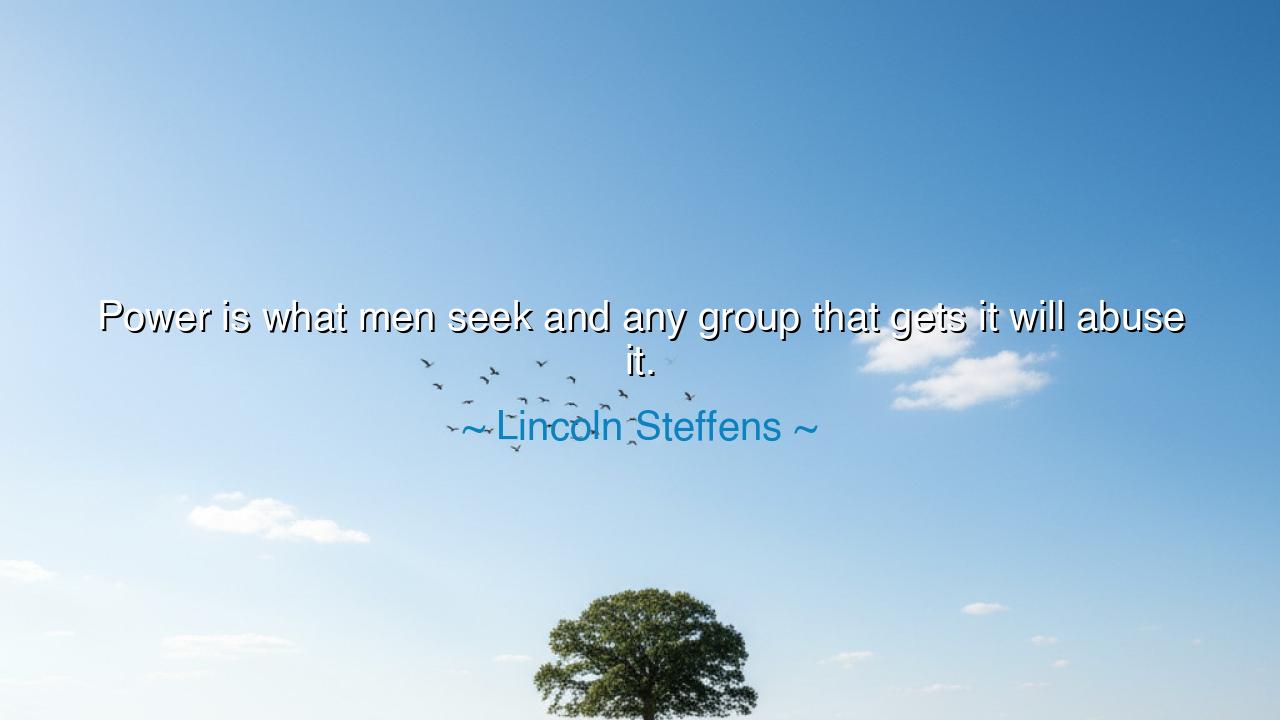
Power is what men seek and any group that gets it will abuse it.






In the great dance of human existence, there is one force that has stirred the hearts of men, sparked conflicts, and shaped the course of history—power. Lincoln Steffens’s words, “Power is what men seek and any group that gets it will abuse it,” ring with the timeless truth that the hunger for power is a mighty force that can blind the soul and corrupt the spirit. Power, once obtained, often leads its possessors down a path of excess, where the desire for control clouds their sense of justice and morality. It is a force both seductive and dangerous, and Steffens’s insight into this human tendency speaks not only to the greed of individuals but to the nature of groups and societies that come to hold power.
The ancients understood this truth with clarity. The great leaders of the past, from Alexander the Great to Julius Caesar, sought power with unwavering resolve. Alexander, in his ambition to conquer the known world, began as a promising leader with a vision of a unified world, yet his hunger for power ultimately led to his own destruction and the destabilization of his empire. His military genius and bravery were undeniable, but as his power grew, so did his arrogance and cruelty. In the end, Alexander’s empire fractured, torn apart by the very forces he sought to control. This is the legacy of those who seek power without a moral compass, for power without restraint leads to inevitable ruin.
In Rome, the rise of Caesar is another stark reminder of the dangers of power. Though Julius Caesar started as a great military leader and statesman, his quest for supreme control led him to betray the very ideals of the Roman Republic. He crossed the Rubicon, a symbolic and literal point of no return, bringing with him the forces that would overthrow the Roman Senate. Once in power, his reign marked the end of the Roman Republic, as his abuse of power set the stage for the rise of the Roman Empire. Caesar’s ambition blinded him to the noble principles of freedom and democracy, and as Steffens warned, the group that achieves power, once corrupted, often abuses it for personal gain and unchecked domination.
Steffens’s insight is not limited to ancient rulers, however; it stretches into the fabric of every society. The history of the world is filled with groups—empires, kingdoms, corporations, and even revolutions—that sought power with noble intentions, only to abuse it once it was within their grasp. The French Revolution, for instance, began with the noble goal of overthrowing the oppressive monarchy and establishing equality and liberty for all. Yet, once the revolutionaries seized control, they too fell prey to the same lust for power that had consumed the monarchs. The Reign of Terror, led by Maximilien Robespierre, became a brutal period of political purges, where the very ideals of the revolution were sacrificed for the consolidation of power. Thus, the revolutionaries, having toppled the old tyrants, became the new oppressors, reinforcing the truth that no group, once in power, is immune to its corrupting influence.
The lesson of Steffens's words is clear and ancient: power corrupts, and the pursuit of it often leads to the abuse of others. This is not just a reflection on the actions of rulers, but a cautionary tale for all who seek to wield authority, whether in politics, business, or personal life. It speaks to the danger inherent in unchecked ambition and the temptation to use power for personal gain rather than the common good. It also serves as a reminder that the very systems that are built to safeguard freedom and justice can be corrupted if those in power are not held accountable and guided by higher principles.
Consider the lesson of history and how it applies to our own lives. Whether we rise to a position of authority in our communities, workplaces, or even within our own families, we must remember that power is a responsibility—not a privilege to be abused. It is easy to become consumed by the idea of power, to believe that we are invincible or beyond reproach, but the truth is, the more power we wield, the more vulnerable we become to its corrupting effects. To lead with integrity requires constant self-reflection, the willingness to question our motives, and the courage to be accountable for our actions. It is only through this vigilance that we can ensure that the power we hold serves the greater good and does not lead to harm.
Thus, let us move forward with humility, knowing that the quest for power can be both dangerous and destructive. Let us strive to wield the influence we have with wisdom, justice, and a sense of responsibility. Let us be aware of the intoxicating allure of power and remain grounded in the values of compassion and self-restraint. For as Steffens so wisely warned, when any group gains power, it is not the individuals or the goals that should be revered, but the higher principles that guide them—principles that ensure power is used not for domination, but for the upliftment of all.






AAdministratorAdministrator
Welcome, honored guests. Please leave a comment, we will respond soon